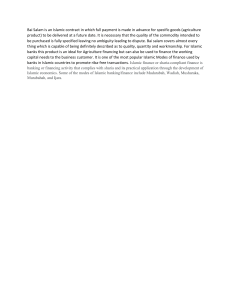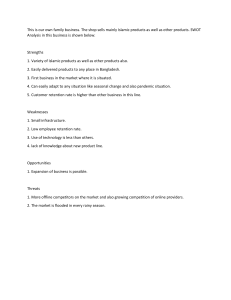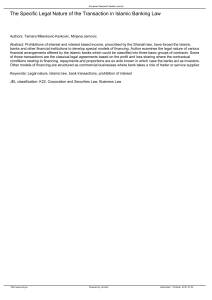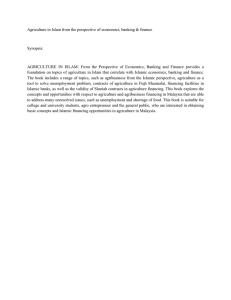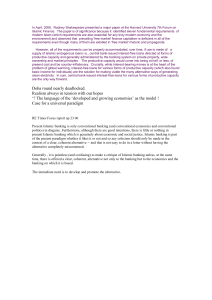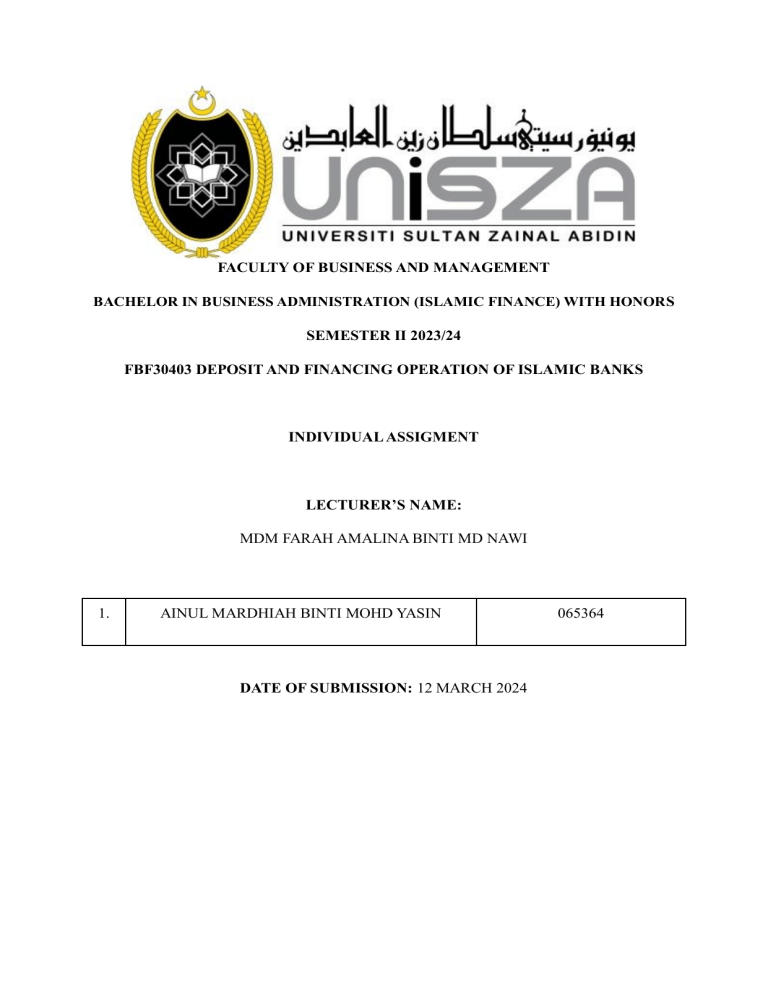
FACULTY OF BUSINESS AND MANAGEMENT BACHELOR IN BUSINESS ADMINISTRATION (ISLAMIC FINANCE) WITH HONOR S SEMESTER II 2023/24 FBF30403 DEPOSIT AND FINANCING OPERATION OF ISLAMIC BANKS INDIVIDUAL ASSIGMENT LECTURER’S NAME: MDM FARAH AMALINA BINTI MD NAWI 1. AINUL MARDHIAH BINTI MOHD YASIN DATE OF SUBMISSION: 12 MARCH 2024 065364 Islamic banking, a system based on Islamic or Shariah law and guided by Islamic economics, offers an ethically driven alternative to conventional banking practices. Also known as non-interest banking, it contrasts with the interest-based operations of conventional banking. Rooted in Islamic finance principles derived from the Quran and the Sunnah, Islamic banking is a universal system, accessible to all regardless of religious beliefs. It emphasizes ethical, moral, and social standards, ensuring fairness, promoting societal prosperity, and achieving harmony by focusing not only on financial aspects but also on the ethical implications of transactions The principles and features of Islamic banking create a stark contrast with conventional banking. One of the foremost principles is the prohibition of Riba, or interest. Islamic banking adopts a system of profit and loss sharing. This means that both the bank and the customer bear the risk of any investment and share the resulting profits. This principle of profit and loss sharing is a defining feature of Islamic banking and is reflected in various common Islamic finance contracts such as Mudarabah, Musharakah, and Ijarah. Through these contracts, the bank and the customer jointly undertake ventures, sharing both the risks and the rewards. This unique approach fosters a sense of partnership and fairness in Islamic banking transactions. The next principle of Islamic banking distinguishes itself from conventional banking through its adherence to the principle of avoiding Gharar, or uncertainty. Islamic banking discourages transactions that involve speculative or ambiguous elements By prioritizing transparency and clarity, Islamic banking aims to create a more stable and ethical financial system. This principle is reflected in various aspects of Islamic banking operations, including the use of contracts such as Mudarabah, Musharakah, and Ijarah, which ensure the sharing of risks and rewards between the bank and the customer. By promoting transparency, fairness, and stability, Islamic banking provides individuals with access to financial services that align with Islamic values and principles. Islamic banking encompasses the principle of avoiding financing businesses and activities deemed Haram, or prohibited, under Islamic law. This principle serves as a guiding pillar, ensuring that Islamic banks abstain from engaging in transactions related to industries involving alcohol, pork, gambling, adult entertainment, and more. By adhering to these ethical guidelines, Islamic banking upholds the values and principles of Islamic law. Additionally, Islamic banking places a strong emphasis on asset-backed financing and transactions, a distinguishing feature from conventional banking practices. This means that every financial transaction within the Islamic banking system must be linked to a tangible asset, ensuring transparency, accountability, and stability. This approach fosters a more responsible and sustainable financial ecosystem, as it discourages speculative practices and encourages investments in real economic activities. By integrating ethical considerations into its operations, Islamic banking aims to create a financial system that promotes societal well-being and aligns with the values of its customers. Overall, the key differences between Islamic banking and conventional banking consist of interest-based transactions, risk sharing, and ethical standards. Conventional banks rely heavily on interest-based transactions, where interest is charged on loans and paid on deposits. Islamic banking strictly prohibits the charging or payment of interest, considering it exploitative and unjust. Instead, Islamic banks engage in profit and loss sharing, leasing arrangements, and other trade-based transactions that adhere to Islamic principles. In terms of risk sharing, conventional banks typically transfer the risk entirely to the borrower, who bears the consequences of any potential losses. In contrast, Islamic banks promote risk sharing between the bank and the customer. Through profit and loss sharing contracts such as Mudarabah and Musharakah, Islamic banks distribute the risks and rewards of investments between the parties involved. This principle fosters a sense of partnership and fairness, aligning the interests of the bank and the customer. Lastly, ethical standards play a significant role in Islamic banking. Islamic banking operates within a strict ethical framework based on Sharia law. The principles and guidelines derived from Islamic teachings guide the operations of Islamic banks, ensuring compliance with moral and ethical standards. These principles prohibit financing activities considered Haram, such as those involving alcohol, pork, gambling, and adult entertainment. In contrast, conventional banks do not have specific religious obligations but are required to comply with the legal and ethical standards of the countries in which they operate. In conclusion, Islamic banking offers a distinct and ethical approach to finance, rooted in Islamic principles and values. With its emphasis on profit and loss sharing, avoidance of uncertainty, adherence to ethical standards, and asset-backed financing, Islamic banking aims to create a financial system that promotes fairness, transparency, and societal well-being. By providing an inclusive and equitable alternative to conventional banking, Islamic banking serves as a testament to the compatibility of finance and morality. PLAGIARISM SCAN REPORT 3% 97% Plagiarised Unique Date 2024-03-12 Words 827 Characters 6085 Content Checked For Plagiarism FACULTY OF BUSINESS AND MANAGEMENT BACHELOR IN BUSINESS ADMINISTRATION (ISLAMIC FINANCE) WITH HONORS SEMESTER II 2023/24 FBF30403 DEPOSIT AND FINANCING OPERATION OF ISLAMIC BANKS INDIVIDUAL ASSIGMENT LECTURER’S NAME: MDM FARAH AMALINA BINTI MD NAWI 1. AINUL MARDHIAH BINTI MOHD YASIN 065364 DATE OF SUBMISSION: 12 MARCH 2024 Islamic banking, a system based on Islamic or Shariah law and guided by Islamic economics, offers an ethically driven alternative to conventional banking practices. Also known as non-interest banking, it contrasts with the interest-based operations of conventional banking. Rooted in Islamic finance principles derived from the Quran and the Sunnah, Islamic banking is a universal system, accessible to all regardless of religious beliefs. It emphasizes ethical, moral, and social standards, ensuring fairness, promoting societal prosperity, and achieving harmony by focusing not only on financial aspects but also on the ethical implications of transactions The principles and features of Islamic banking create a stark contrast with conventional banking. One of the foremost principles is the prohibition of Riba, or interest. Islamic banking adopts a system of profit and loss sharing. This means that both the bank and the customer bear the risk of any investment and share the resulting profits. This principle of profit and loss sharing is a defining feature of Islamic banking and is reflected in various common Islamic finance contracts such as Mudarabah, Musharakah, and Ijarah. Through these contracts, the bank and the customer jointly undertake ventures, sharing both the risks and the rewards. This unique approach fosters a sense of partnership and fairness in Islamic banking transactions. The next principle of Islamic banking distinguishes itself from conventional banking through its adherence to the principle of avoiding Gharar, or uncertainty. Islamic banking discourages transactions that involve speculative or ambiguous elements By prioritizing transparency and clarity, Islamic banking aims to create a more stable and ethical financial system. This principle is reflected in various aspects of Islamic banking operations, including the use of contracts such as Mudarabah, Musharakah, and Ijarah, which ensure the sharing of risks and rewards between the bank and the customer. By Page 1 of 2 promoting transparency, fairness, and stability, Islamic banking provides individuals with access to financial services that align with Islamic values and principles. Islamic banking encompasses the principle of avoiding financing businesses and activities deemed Haram, or prohibited, under Islamic law. This principle serves as a guiding pillar, ensuring that Islamic banks abstain from engaging in transactions related to industries involving alcohol, pork, gambling, adult entertainment, and more. By adhering to these ethical guidelines, Islamic banking upholds the values and principles of Islamic law. Additionally, Islamic banking places a strong emphasis on asset-backed financing and transactions, a distinguishing feature from conventional banking practices. This means that every financial transaction within the Islamic banking system must be linked to a tangible asset, ensuring transparency, accountability, and stability. This approach fosters a more responsible and sustainable financial ecosystem, as it discourages speculative practices and encourages investments in real economic activities. By integrating ethical considerations into its operations, Islamic banking aims to create a financial system that promotes societal well-being and aligns with the values of its customers. Overall, the key differences between Islamic banking and conventional banking consist of interest-based transactions, risk sharing, and ethical standards. Conventional banks rely heavily on interest-based transactions, where interest is charged on loans and paid on deposits. Islamic banking strictly prohibits the charging or payment of interest, considering it exploitative and unjust. Instead, Islamic banks engage in profit and loss sharing, leasing arrangements, and other tradebased transactions that adhere to Islamic principles. In terms of risk sharing, conventional banks typically transfer the risk entirely to the borrower, who bears the consequences of any potential losses. In contrast, Islamic banks promote risk sharing between the bank and the customer. Through profit and loss sharing contracts such as Mudarabah and Musharakah, Islamic banks distribute the risks and rewards of investments between the parties involved. This principle fosters a sense of partnership and fairness, aligning the interests of the bank and the customer. Lastly, ethical standards play a significant role in Islamic banking. Islamic banking operates within a strict ethical framework based on Sharia law. The principles and guidelines derived from Islamic teachings guide the operations of Islamic banks, ensuring compliance with moral and ethical standards. These principles prohibit financing activities considered Haram, such as those involving alcohol, pork, gambling, and adult entertainment. In contrast, conventional banks do not have specific religious obligations but are required to comply with the legal and ethical standards of the countries in which they operate. In conclusion, Islamic banking offers a distinct and ethical approach to finance, rooted in Islamic principles and values. With its emphasis on profit and loss sharing, avoidance of uncertainty, adherence to ethical standards, and asset-backed financing, Islamic banking aims to create a financial system that promotes fairness, transparency, and societal well-being. By providing an inclusive and equitable alternative to conventional banking, Islamic banking serves as a testament to the compatibility of finance and morality. Matched Source Similarity 25% Title:Expert Review Template G22 BRM - PROGRAMME Try your best programme: bachelor in business administration (islamic finance) with honors code and course name: business research methodology (mss22103) https://www.studocu.com/my/document/universiti-sultan-zainal-abidin/international-business/expert-review-template-g22brm/62498867 Page 2 of 2

